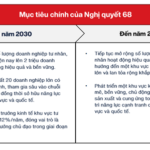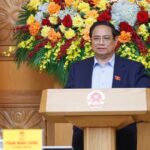
A vibrant manufacturing floor at a company in Hoa Binh city, Hoa Binh province. (Photo: Trong Dat/VNA)
|
The recent issuance of Resolution No. 68-NQ/TW by the Politburo regarding the development of the private sector economy (Resolution 68) has garnered immense support from experts and the business community.
The Resolution signifies a breakthrough in development thinking, heralding a “revolution in thinking and institutions” and a “historic turning point” in boosting the private economy with inspiring and aspirational goals. It aims to propel Vietnam into a new era of innovation, integration, and prosperity.
Anticipating the Practical Implementation of Resolution 68
Dr. Vo Tri Thanh, former Vice President of the Central Institute for Economic Management and President of the Institute for Brand and Competition Strategy Research, highly appreciates this Resolution. For the first time, the Politburo emphasizes the view that developing the private economy rapidly, sustainably, and effectively is both an urgent task and a long-term strategy.
Resolution 68 demonstrates a strong political commitment to the business community, business households, and the people: The state will create an enabling environment, with businesses as the central focus, and developing the private economy is a long-term strategy rather than a temporary measure. This has instilled trust—an invaluable yet crucial asset for the robust and sustainable growth of the private sector. Consequently, it has infused a new vigor, boosting the morale and positive energy of the business community.
According to Dr. Vo Tri Thanh, the FDI sector currently contributes over 20% to GDP, while the state-owned enterprise sector accounts for a similar proportion. In contrast, the domestic private economy makes up more than 50%. If the GDP growth target for 2025 is set at 8%, and the aspiration is for double-digit growth in the future, the role of the private sector becomes extremely important.

Dr. Vo Tri Thanh. (Source: VNA)
|
In the view of Dr. Vo Tri Thanh, the adoption of Resolution 68 marks the third breakthrough in the history of private sector development. The first breakthrough was recognizing the private sector, and the second was granting business rights and reforming administrative procedures, mainly regarding market entry. Resolution 68 takes it a step further, facilitating a qualitative transformation in the private sector.
The Resolution unequivocally asserts the requirement for equality among economic sectors in terms of business opportunities, resource access, and more. This will not remain merely on paper but will be institutionalized through specific solutions. If discriminatory behavior persists, those responsible will be held accountable. Thus, the orientation to develop the private sector into a robust yet sustainable force should be understood as addressing not only immediate challenges but also ensuring its long-term role, alongside state-owned enterprises, now and in the future…
Pioneering the Development of a Market Economy
Mr. Hoang Duc Thao, General Director of the Vietnam Science and Technology Joint Stock Company (Busadco) and Chairman of the Vietnam Association of Science and Technology Enterprises, believes that Resolution 68 conveys a message that ignites national pride, a legitimate aspiration for wealth, a spirit of innovation, and the entrepreneurial drive of Vietnamese entrepreneurs and citizens.
If effectively implemented, this Resolution will serve as a “catalyst” to propel Vietnam into a new era of development, with the private sector taking the lead, imbued with a sense of proactiveness, self-reliance, and ambition.
The policies and determination outlined in Resolution 68 are clear, necessitating immediate action. There is a need to establish a synchronous institutional framework across all fields of law related to private sector development and state control over private economic activities. Ensuring access to affordable and suitable capital and payment systems that facilitate digital transformation is crucial for boosting business confidence and self-reliance.
Mr. Hoang Duc Thao also acknowledges the challenges faced by entrepreneurs, ranging from competition and market issues to tariffs. Their responsibility is to sustain their businesses. Hence, specific policies to support private enterprises are imperative, with tax incentives being the most critical. Land incentives are equally important, and steps should be taken to enable enterprises to maximize the value of land for production and commercial services.
Local Proactiveness in Aligning with Resolution 68
From a local perspective, Mr. Nguyen Khac Hieu, Vice Chairman of the People’s Committee of Vinh Phuc province, shared that Resolution 68 has fostered a strong consensus within society and the local business community. He believes it presents an opportunity to unlock various resources, particularly financial potential, to promote the efficient development of the private sector, thereby making significant contributions to economic growth.
Vinh Phuc province has always recognized the private economy as a crucial driver of local development. The province has been transparent in disclosing its planning, development orientation, and priority investment sectors to help individuals and businesses formulate long-term strategies. Vinh Phuc has also set growth targets not only for 2025 but also for the long-term horizon of 2045. To achieve these goals, several synchronized solutions have been implemented, including reviewing and expediting key projects, reorganizing the apparatus of administration towards a more streamlined, efficient, and effective structure.
In addition to organizational reforms, the locality has promoted digital transformation and administrative reforms, applying information technology in governance and public service delivery to facilitate businesses and citizens.

Workers at a wood export enterprise. (Source: VNA)
|
Furthermore, the province assigns specific targets to each department and sector, implementing measures to increase budget revenues and develop culture and society as a solid foundation for sustainable growth.
According to Mr. Nguyen Khac Hieu, the spirit of supporting private economic development, as directed by Resolution 68, has been integrated into the province’s action program and socio-economic development plan for the 2021-2025 period, with a vision towards 2045. The central directives have been concretized in investment attraction, business support, and the improvement of the business environment. Dialogues with the private sector, particularly in high-tech fields, supporting industries, green urban development, and quality services, have been increasingly promoted.
Dieu Thuy – Thanh Huong
– 10:20 13/05/2025
Unlocking Vietnam’s Economic Potential: Resolution 68 and the Rise of the Private Sector
The Politburo has issued Resolution 68 – a significant directive that is expected to bring about a major shift in the orientation of private sector development in Vietnam. Marked as a historic turning point, this Resolution elevates the private sector’s status, clearly recognizing it as the “most important driving force of the national economy.”
How to Instill Confidence in People to Invest Their Money?
The proposal to develop a Law on Private Economic Development is an exciting and much-anticipated development. This law has the potential to revolutionize the economic landscape, offering a unified policy framework and resolving long-standing contradictions and overlaps that have hindered businesses. With this law, we can expect a new era of economic growth and a more conducive environment for private enterprises to thrive.
“Dr. Nguyen Van Dinh: Resolution 68 Becomes a ‘Revolution’ for the Real Estate Market”
“The renowned academic, Dr. Nguyen Van Dinh, highlights the groundbreaking nature of Resolution 68, describing it as a ‘true revolution in mechanism’. This resolution marks a pivotal moment as, for the first time, a high-level document emphatically acknowledges the pivotal role of private enterprises.
‘Shortcuts to Success’ in Vietnam Has Never Been This Obvious
The resolution No. 68-NQ/TW, issued by the Political Bureau on May 4, 2025, marks a pivotal turning point for the development of the private economy. This landmark resolution introduces a comprehensive set of solutions aimed at eliminating red tape, enhancing protection for businesses entering the market, and unleashing the full potential of economic resources.
Unlocking Private Sector Innovation: A Boundless Approach to Economic Growth
On the afternoon of May 8, Prime Minister Pham Minh Chinh chaired a meeting with the Policy Advisory Council to finalize the draft resolution of the National Assembly on special mechanisms and policies to promote the private economy. This crucial step forward aligns with Resolution 68 of the Political Bureau.





















